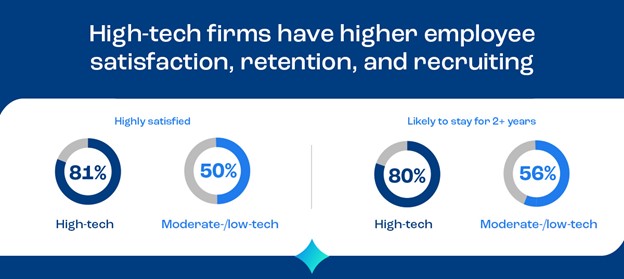From virtual voice assistants to ChatGPT, AI tools are transforming our daily personal lives. Now, fee earners want to use AI technology in their professional lives, too.
As our Intapp 2024 Tech Perceptions Survey shows, 91% of survey respondents want to use AI at work. However, many firms are cautious about implementing AI technology. In fact, less than half of survey respondents believe they’ve used AI at work, and only 45% rated their firm as highly tech-savvy.
Why are so many firms hesitant to adopt new AI tools and processes? Our survey shows that the three biggest concerns include data quality, security, and staffing. We’ll explore each of these concerns and how your firm can address them.

1. Data quality
Most firms use multiple data systems, such as document management systems, practice management systems, CRMs, and Microsoft Teams. However, these systems are often disjointed and unstructured.
When data is unstructured cross multiple systems, it takes longer for AI tools to find and access information. And if that information is also inaccurate or outdated, then your AI tools can’t properly make predictions or recommendations.
Your AI tool is only as good as the data it uses, which is why you need to maintain high-quality data. Clean your data by:
- Removing duplicative or irrelevant data
- Fixing any inaccurate data
- Adding any missing metadata and values
- Ensuring all data is labeled, categorized, and structured in a consistent manner
This process may seem daunting, but AI technology can help. AI-based data architecture and collaboration solutions can help you create, structure, and manage your engagement workspaces and content management system. AI can also help repair inaccurate or incomplete data and set algorithm parameters to catch potential errors.
By maintaining clean, structured data, your AI solution will be able to quickly provide accurate information and insights to your teams — so they can make better data-driven decisions for your firm.
2. Security
Generative AI creates content based on the proprietary data it can access. But how can you ensure your AI solution won’t create and share content based on confidential information?
From conflicts of interests to insider trading, there are many reasons staff shouldn’t have access to certain information. To prevent your AI tools from oversharing data, you need proper ethical walls and security requirements.
Choose a technology provider that offers industry-leading security to help your firm manage access to sensitive information. This way, your professionals can confidently use generative AI without fear of accessing confidential data.
3. Staffing
One of the biggest fears about AI technology is that it will replace people and take over their jobs. What many professionals fail to realize is that AI can actually help them perform their jobs more efficiently — especially when used for mundane tasks such as tracking billable hours or generating responses for support tickets.
Many professionals work unduly long hours due to these manual, time-consuming tasks. But if AI performs these tasks instead, fee earners can save valuable hours every week and achieve better work/life balance. They can also focus more on value-driven work and provide better service to their clients.
Our survey also shows that fee earners at high-tech firms feel better positioned to reach both organizational and professional goals — including developing expertise in their field and getting promoted. Consequentially, high-tech firms have higher satisfaction, retention, and recommendation rates than low- and moderate-tech firms.
In other words, firms that invest in AI and automation tools are less likely to lose talent to their competitors, and more likely to attract and retain talent. Rather than reduce staff, AI can help your teams grow.

Keep your staff and clients happy
AI adoption is increasing rapidly, and for good reason. AI can be a valuable tool for helping professionals save time on low-level tasks and increase performance. And as workload and client demands increase, professionals need technology more than ever to support them and help them work more efficiently.
AI is quickly becoming a necessity in the industry rather than a nicety. If your firm isn’t willing to adopt and use AI, your staff and clients may turn to firms that are.
By structuring and securing your data, you can help ensure a smooth implementation process for your AI software. Although it can be a significant undertaking, an expert technology provider can make the process faster and easier. With investment in the right AI provider and solutions, your firm can stay competitive, deliver the best client service possible, and retain top talent.
Read our full 2024 Technology Perceptions Survey Report to learn more about the benefits of AI and professionals’ technology expectations for their firms.
